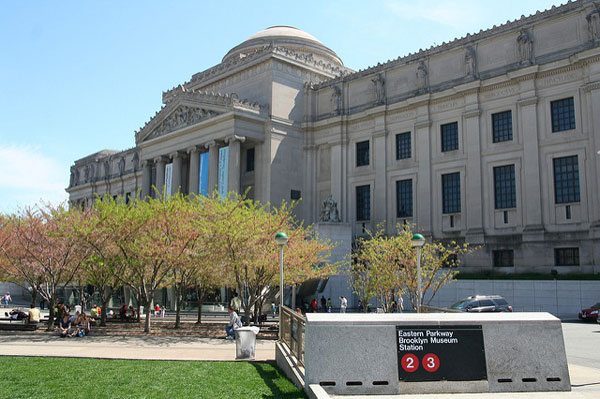
April 30, 2018; Gothamist
On Sunday, about 65 protestors gathered at the Brooklyn Museum to assert their opposition to a recent curatorial hire and ask for a decolonization commission to address broader community concerns.
Decolonize This Place activists initially opposed the hire of Kristen Windmuller-Luna, a white woman, as a consulting curator for the museum’s extensive African art collection. However, their protest centered not around the hiring decision but around the broader forces that they say separate the museum from the local community, which faces displacement and erasure. Amrit Trewn, the organizing co-chair of Black Youth Project 100 NYC, told Hyperallergic, “We’re asking for a shift in the culture of the institution. This is an opportunity not to shame one person but to levy decolonial demands on a museum and invite them to say what they stand for.”
Imani Henry, who is a lead organizer with Equality for Flatbush, said, “In this decade, the programming has started to cater to people with more wealth and the exhibitions started catering to white and middle-class people. I remember when it was majority black at many children’s event[s], but now I don’t feel that.”
Both groups are among those that collaborated with DTP to organize the protest, including W.A.G.E., the Bronx Social Center, and Occupy Museums.

Sign up for our free newsletters
Subscribe to NPQ's newsletters to have our top stories delivered directly to your inbox.
By signing up, you agree to our privacy policy and terms of use, and to receive messages from NPQ and our partners.
The protestors’ demands revolve around a couple of central ideas: One, that the museum stands on land stolen from Lenape Indians and includes a number of artifacts expropriated from Native American communities but neither acknowledges those legacies nor includes Native people in its decision-making; and two, that the museum, once deeply connected to the surrounding communities of Crown Heights and Prospect Heights, is complicit in the gentrification of Brooklyn that forces out residents of color from those neighborhoods—in part because, again, they are not represented among the museum’s board or curatorial staff. (NPQ has written previously about the serious lack of diversity among museum boards.)
An open letter from Decolonize This Place asked the museum to establish a Decolonization Commission, which would include local stakeholders, to explore:
- Territorial Acknowledgement of Indigenous land occupied by its buildings and giving material effect to such an acknowledgment in curatorial practices, programming, exhibitions, and day-to-day operations.
- The deep diversification of curatorial staff and executive leadership whereby the lived experience of oppressions, including patriarchy, white supremacy, and poverty are valued and factored in.
- A decolonial inventory of colonial-era objects of both African and Indigenous people with a view to settling the long-pursued claims of reparations and repatriation.
- An upgrade of working conditions and pay of ground staff—who are disproportionately employees of color—in security, food service, and janitorial divisions.
- The replacement of Board president David Berliner and other trustees who are real estate tycoons with a broad cross-section of artists and community organizers.
- The undertaking of a de-gentrification initiative to examine and mitigate the museum’s role in boosting land value and rents in the borough.
- An institutional commitment to address the issues raised by the Boycott, Divestment, and Sanctions (BDS) movement in recognition of the debate among Brooklynites about the central role played by segments of the borough’s population in the settler movement in Palestine.
After an initial round of speeches at the Brooklyn Museum, the protestors moved to the Brooklyn Botanical Gardens, where they denounced a plan to build a 42-story luxury high-rise that would overlook the gardens. Unlike the museum, Brooklyn Botanical Gardens agreed to a meeting with the Movement to Protect the People.
After DTP’s original opposition to the hire of Windmuller-Luna, Brooklyn Museum director Anne Pasternak released a statement to Hyperallergic, saying, “I am writing to state unequivocally that the Brooklyn Museum stands by our appointment…With her anticolonial approach to curating, she has devoted her professional life to celebrating the individual identities of historical African cultures.” Windmuller-Luna is a lecturer at Columbia University and a former fellow at the Metropolitan Museum. Pasternak agreed that “it is right to press museums and other institutions to diversify their leadership,” but did not offer any concrete steps her museum might take.
But what DTP and their fellow activists are asking for is not simply inclusion, but a fundamental reimagining of the knowledge and power systems that govern museum decisions. The open letter asks the museum to “resist falling back on the default criterion of Ivy League-expertise that by its very nature is biased towards white scholars,” and instead acknowledge other systems of knowledge that have been sidelined by colonial practice, something echoed by many of the groups that, for example, press philanthropy to invest in the South. Shellyne Rodriguez, who helped lead the protest, emphasized, “Diverse programming is not enough! It is cosmetic solidarity. The museum wants our art, our culture, but not our people.”
Crystal Migwans of NYC Stands with Standing Rock, asked for a deep consideration: “You are standing on indigenous land, you are standing on indigenous labor. Whenever you are in a space like this ask yourself: where are you standing?”—Erin Rubin













